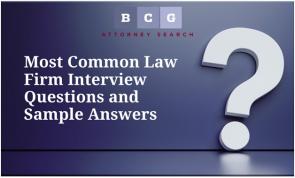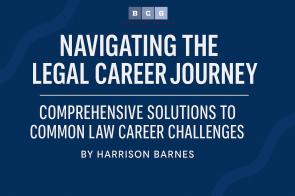
Question: Should I lower my expectations if I keep getting rejected by the top firms I’m applying to?
Answer: While it’s understandable to aim for positions at top-tier law firms, you may need to broaden your approach if you’re experiencing consistent rejection. Top law firms—often referred to as "elite" or "BigLaw" firms—are extremely competitive, and even the most qualified candidates can find it challenging to secure a position. However, consistent rejection does not mean you should lower your expectations altogether; instead, consider applying to a more diverse range of firms, including mid-size and boutique firms. For a step-by-step framework that complements this advice, read Navigating the Legal Career Journey: Comprehensive Solutions to Common Law Career Challenges.
Applying to a variety of firms increases your chances of landing a position. It’s also essential to assess whether your application materials—such as your resume and cover letter—are optimized. Are you clearly highlighting your strengths and presenting yourself as the best candidate for each position? Sometimes the issue lies not in the candidate’s qualifications but in how they are presented. Tailoring your resume and cover letter for each specific firm, emphasizing relevant skills, and making a strong case for why you’re the right fit can make all the difference.
- Understanding how to overcome legal career rejections is crucial for long-term success.
Additionally, consider whether your expectations align with the realities of the current job market. Market conditions fluctuate, and certain practice areas may be in higher demand than others. If your background is in a saturated area of law, it may take longer to find a position. This doesn’t mean you should lower your standards, but rather that you should adapt your strategy to increase your chances of success. Persistence, coupled with a flexible approach, will ultimately lead you to the right opportunity. For a deeper exploration of job-market complexities, see Navigating the Complexities of the Legal Job Market: Answers to Your Toughest Questions.
- For additional strategies on overcoming common career challenges, see Mastering the Legal Job Market: Overcoming the Top Reasons for Attorney Rejection.
See Related Articles:
- Mastering the Legal Job Market: Overcoming the Top Reasons for Attorney Rejection
- Thriving in Law Firms: Overcoming Rejection and Building Resilience
- Dealing with Rejection
Answer: Identifying the right firms to apply to involves a combination of research, networking, and strategic thinking. First, it’s crucial to understand that even within the same firm, different practice areas may have very different hiring needs and cultures. A firm that may not seem like a fit for your experience in one area might have an entirely different dynamic in another practice group.
Start by researching firms that have a history of hiring in your practice area. Look for firms that have a strong client base and active cases in the sectors you're interested in. You can gather this information by reviewing the firm’s website, reading legal news articles, and checking industry reports. Additionally, leverage your professional network to gather insider insights about the firms you’re interested in. Personal referrals or recommendations from colleagues can help you get your foot in the door and give you a clearer picture of the firm’s culture and hiring needs.
It’s also essential to apply widely. Many attorneys make the mistake of limiting their applications to a narrow set of firms based on online reviews or surface-level assumptions. Even if you don’t think a particular firm is the perfect fit, it’s worth applying. There are often hidden opportunities within firms that aren’t reflected in their public-facing information. By casting a wide net and applying to a range of firms—both large and small—you increase your chances of finding the right match.
Finally, be persistent. Even if you face rejection initially, continue to apply to firms that align with your goals. Firms’ hiring needs change over time, and a firm that wasn’t hiring when you first applied may have new openings in the future. By staying proactive and continually improving your application materials, you can significantly reduce your chances of rejection.
- When bouncing back from setbacks, it pays to keep the bigger picture in mind—see this roadmap to long-term legal success for insights on resilience through depth and relationships.
Question: Is it reasonable for an LLM graduate to apply for paralegal positions while awaiting bar results?
Answer: No, it is not advisable for an LLM graduate to apply for paralegal positions while awaiting bar results. Applying for a paralegal role when you have an LLM can signal to potential employers that you are underselling your qualifications or that you lack confidence in your ability to secure an attorney position. This can negatively affect how you are perceived in the long term, even after you pass the bar.
Instead, focus on applying for entry-level attorney roles that match your level of education and experience. Many law firms are open to hiring new graduates who are awaiting bar results, especially if they are confident that the candidate will pass the bar exam. Make sure to emphasize your educational background, any internships or clerkships, and the areas of law you are interested in practicing. Presenting yourself as a future attorney, rather than a paralegal, helps position you for success in the legal field.
In addition, you can use the time while awaiting bar results to further your legal knowledge or gain practical experience through temporary legal positions or internships. Some law firms offer short-term roles for law graduates who are waiting for bar admission, and these positions can give you valuable experience while you wait to become fully licensed. Keep your focus on roles that will advance your legal career and help you transition smoothly into a full attorney role once you pass the bar.
- Learning to avoid self-sabotage in legal careers can lead to more fulfilling professional experiences.
Question: What advice do you have for someone transitioning from civil litigation to a transactional role in estate planning?
Answer: Transitioning from civil litigation to estate planning is entirely feasible, especially if you already have some experience in trust and estate matters. Estate planning, particularly on the transactional side, is a growing and stable area of law. Clients are increasingly looking for attorneys who can help them navigate complex estate planning issues, especially as tax laws and regulations evolve. Your background in litigation can serve as a valuable asset, particularly in cases where estate plans lead to disputes or when clients need representation in probate matters.
To make this transition, focus on highlighting the overlap between your litigation experience and the transactional aspects of estate planning. For example, if you’ve handled any cases involving trust disputes, probate litigation, or guardianship matters, be sure to emphasize these experiences. Even if your experience in estate planning is limited, showcase your ability to learn new areas of law quickly and your strong legal research skills. Estate planning often involves complex legal documents, such as wills and trusts, so emphasize your attention to detail and ability to draft precise legal documents.
Additionally, consider taking continuing education courses or earning certifications in estate planning to further bolster your qualifications. Many states offer certification programs for attorneys looking to specialize in estate planning or probate law. By demonstrating your commitment to transitioning into this practice area, you can position yourself as a strong candidate for estate planning roles, even if your previous experience is primarily in litigation.
- Mastering law firm interview questions is essential for making a strong impression.
Question: What interview advice would you give for someone with no prior experience in a particular practice area?
Answer: If you are interviewing for a position in a practice area where you have no prior experience, the most important thing is to demonstrate your willingness to learn and your passion for the field. Employers understand that candidates might not always have direct experience in every practice area, but they will look for transferable skills and a genuine interest in the work.
Start by researching the practice area extensively. Understand the key legal issues, trends, and challenges within that field. During the interview, express why you are excited about the practice area and how your existing skills will translate into success. For instance, if you’re transitioning from corporate law to intellectual property, emphasize your understanding of business law and contracts, which are often integral to IP work. Make it clear that you are ready to hit the ground running by diving into the new subject matter and mastering it quickly.
- Understanding key decisions for attorneys without business can guide your career path.
Moreover, highlight any soft skills that can make up for a lack of direct experience. Strong analytical thinking, effective communication, attention to detail, and the ability to manage large workloads are essential in virtually all areas of law. By showing that you possess these skills and have a strong work ethic, you can overcome the experience gap and demonstrate that you will be a valuable asset to the firm.
Finally, don’t be afraid to discuss any self-study or professional development you’ve undertaken in the new practice area. Whether it’s attending CLEs, reading industry journals, or networking with professionals in the field, these activities demonstrate your commitment to growing and excelling in the new area.
- Addressing common attorney career concerns can provide clarity and direction.
See Related Articles:
- The Art of Interviewing: Tips for Converting Interviews into Offers
- The Best Interview Tips For Your Law Firm Interview
- Off-the-Record Interview Tips from Law Firm Interviewers
Answer: Absolutely. Expanding your job search to smaller or less competitive markets can significantly increase your chances of finding the right opportunity. While large metropolitan areas like New York, Chicago, or Los Angeles may offer more job openings, they also attract the most competition. Smaller markets, on the other hand, may have fewer applicants for each position, allowing you to stand out more easily.
For instance, law firms in mid-sized cities or smaller regions may have a harder time attracting top-tier talent, making them more open to hiring candidates with strong resumes from larger markets. If you’re struggling to break into a competitive market, consider applying to law firms in smaller cities where the supply of attorneys may not meet the demand.
Additionally, smaller markets may offer other benefits, such as a better work-life balance, lower cost of living, and greater opportunities for client interaction. Firms in these markets often allow associates to take on more responsibilities early in their careers, providing valuable experience that can lead to more significant roles down the line. Don’t overlook the value that smaller or less competitive markets can offer, especially if you are willing to relocate.
- Seeking guidance on legal career transitions can provide clarity and direction.
Question: How can I make myself stand out when competing with a large pool of candidates?
Answer: The key to standing out in a competitive job market is to make your resume, cover letter, and professional presence as strong as possible. One effective strategy is to demonstrate thought leadership through publications, presentations, or participation in legal organizations. Writing articles, giving talks at industry conferences, or taking leadership roles within professional associations can make you more visible to hiring managers.
Additionally, it’s essential to tailor your application materials for each position. A generic resume and cover letter will blend into the crowd, but a well-crafted application that highlights your most relevant experience and skills will stand out. Make sure to research the firm and the specific practice area you’re applying to so you can speak directly to what they are looking for.
Networking is another critical factor in standing out. Building relationships with attorneys, partners, and recruiters can help get your name in front of decision-makers before you even apply. Attending industry events, reaching out for informational interviews, and keeping in touch with your professional contacts can help you stay top-of-mind when opportunities arise.
- Many attorneys struggle to find direction, which is why 'The Legal Career Specialization Imperative' emphasizes the power of focused positioning in overcoming obstacles."
Read the full article here
Question: How do I handle rejection without letting it affect my self-confidence and job search momentum?
Answer: Rejection is a normal part of the legal profession, and the most successful attorneys are often those who learn how to manage it without letting it derail their career aspirations. The key is to view each rejection as an opportunity to learn and grow. Rather than internalizing rejection as a reflection of your worth, use it as constructive feedback to refine your approach.
- Implementing strategies for law firm partner lateral moves can enhance your career trajectory.
Start by reflecting on the factors that may have contributed to the rejection. Was it a matter of firm culture? Were your application materials not tailored to the specific needs of the firm? By analyzing what may have gone wrong, you can make necessary adjustments for the next opportunity.
It’s also important to maintain a long-term perspective. Rejection is not a permanent roadblock; it’s a temporary setback on your journey. For additional context on overcoming setbacks across practice settings, read this comprehensive Q&A on legal-career complexities.Many successful attorneys faced numerous rejections early in their careers but used those experiences to refine their skills and approach. Keep the bigger picture in mind and stay focused on your ultimate goals. For more targeted interview strategies, check out BCG Attorney Search Q&A: Enhancing Your Legal Career Prospects.
- Securing a major law firm job without top credentials is challenging but achievable.
Finally, don’t hesitate to seek support. Whether it’s through mentorship, networking, or professional development, surrounding yourself with a supportive community can help you stay motivated and focused. Rejection is easier to handle when you have others encouraging you and providing guidance along the way.
- Implementing effective law firm job search strategies can significantly enhance your prospects.
See Related Articles:
- Why an Attorney Should Never Give Up after Being Rejected from a Few (or Many) Law Firms
- Dealing with Rejection: Job Searching in a Dating Context
- Coping with the Process of Applying for a Position in a Law Firm: Do Not Let Silence, Delay, Ambiguity, or Rejection Get You Down!
Conclusion
For a deeper understanding of the structural realities shaping attorney careers—and why exploitation is often built into law firm success—see this transcript on Why Attorneys Need to Be Exploited to Succeed. Navigating the legal profession can be challenging, but with persistence, strategic thinking, and a proactive approach, attorneys can overcome obstacles and build successful careers. By learning from rejection, continuously improving, and expanding your network, you can set yourself up for long-term success.
- For further insights into overcoming law firm rejections, explore our strategies to overcome law firm rejections.
1. How can attorneys bounce back from law firm rejection during their job search?
Answer: Rejection is a normal part of the attorney job search, even for highly qualified candidates. Focus on refining your resume, tailoring applications for each firm, and networking with legal recruiters who understand your practice area. Viewing rejection as an opportunity to improve strategy can turn setbacks into momentum. For tailored guidance and current openings, BCG Attorney Search offers tools and recruiter insights to help attorneys rebound effectively.2. Why is networking critical for attorney career growth in competitive law firm hiring?
Answer: Networking gives attorneys access to insider information about law firm hiring and potential lateral moves. Many firms prefer referrals, making connections a key factor in career growth. Regularly attending legal events, leveraging alumni networks, and building relationships with recruiters can significantly improve your chances of landing interviews and advancing in your career.3. Can a lateral move help an attorney overcome stagnation in a BigLaw firm?
Answer: Yes, strategic lateral moves can provide attorneys with new opportunities, expanded practice experience, and faster career progression. Assess firms where your skills fill a critical need, and ensure the move aligns with your long-term goals. Lateral transitions, when done thoughtfully, often lead to better client exposure, higher compensation, and potential partner-track opportunities.4. What role do legal recruiters play in minimizing career setbacks for attorneys?
Answer: Legal recruiters offer personalized insights on law firm hiring trends, market demand, and strategic career moves. They help attorneys identify openings that match both skills and career goals, saving time and improving job search efficiency. Partnering with an experienced recruiter, like those at BCG Attorney Search, can give attorneys an edge in navigating rejection and securing the right positions.5. Should attorneys consider boutique firms when facing repeated rejections from top-tier firms?
Answer: Absolutely. Boutique firms often provide significant client exposure, meaningful responsibilities, and faster paths to career milestones. Exploring mid-size and boutique options can reduce rejection risk and open doors to lateral moves or partner-track opportunities. For current listings and strategic advice on choosing the right firm, BCG Attorney Search provides comprehensive resources for attorneys at every career stage.About Harrison Barnes
No legal recruiter in the United States has placed more attorneys at top law firms across every practice area than Harrison Barnes. His unmatched expertise, industry connections, and proven placement strategies have made him the most influential legal career advisor for attorneys seeking success in Big Law, elite boutiques, mid-sized firms, small firms, firms in the largest and smallest markets, and in over 350 separate practice areas.
A Reach Unlike Any Other Legal Recruiter
Most legal recruiters focus only on placing attorneys in large markets or specific practice areas, but Harrison places attorneys at all levels, in all practice areas, and in all locations-from the most prestigious firms in New York, Los Angeles, and Washington, D.C., to small and mid-sized firms in rural markets. Every week, he successfully places attorneys not only in high-demand practice areas like corporate and litigation but also in niche and less commonly recruited areas such as:
- Immigration Law
- Workers Compensation
- Insurance
- Family Law
- Trust and Estate
- Municipal law
- And many more...
This breadth of placements is unheard of in the legal recruiting industry and is a testament to his extraordinary ability to connect attorneys with the right firms, regardless of market size or practice area.
Proven Success at All Levels
With over 25 years of experience, Harrison has successfully placed attorneys at over 1,000 law firms, including:
- Top Am Law 100 firms such including Sullivan and Cromwell, and almost every AmLaw 100 and AmLaw 200 law firm.
- Elite boutique firms with specialized practices
- Mid-sized firms looking to expand their practice areas
- Growing firms in small and rural markets
He has also placed hundreds of law firm partners and has worked on firm and practice area mergers, helping law firms strategically grow their teams.
Unmatched Commitment to Attorney Success - The Story of BCG Attorney Search
Harrison Barnes is not just the most effective legal recruiter in the country, he is also the founder of BCG Attorney Search, a recruiting powerhouse that has helped thousands of attorneys transform their careers. His vision for BCG goes beyond just job placement; it is built on a mission to provide attorneys with opportunities they would never have access to otherwise. Unlike traditional recruiting firms, BCG Attorney Search operates as a career partner, not just a placement service. The firm's unparalleled resources, including a team of over 150 employees, enable it to offer customized job searches, direct outreach to firms, and market intelligence that no other legal recruiting service provides. Attorneys working with Harrison and BCG gain access to hidden opportunities, real-time insights on firm hiring trends, and guidance from a team that truly understands the legal market. You can read more about how BCG Attorney Search revolutionizes legal recruiting here: The Story of BCG Attorney Search and What We Do for You.
The Most Trusted Career Advisor for Attorneys
Harrison's legal career insights are the most widely followed in the profession.
- His articles on BCG Search alone are read by over 150,000 attorneys per month, making his guidance the most sought-after in the legal field. Read his latest insights here.
- He has conducted hundreds of hours of career development webinars, available here: Harrison Barnes Webinar Replays.
- His placement success is unmatched-see examples here: Harrison Barnes' Attorney Placements.
- He has created numerous comprehensive career development courses, including BigLaw Breakthrough, designed to help attorneys land positions at elite law firms.
Submit Your Resume to Work with Harrison Barnes
If you are serious about advancing your legal career and want access to the most sought-after law firm opportunities, Harrison Barnes is the most powerful recruiter to have on your side.
Submit your resume today to start working with him: Submit Resume Here
With an unmatched track record of success, a vast team of over 150 dedicated employees, and a reach into every market and practice area, Harrison Barnes is the recruiter who makes career transformations happen and has the talent and resources behind him to make this happen.
A Relentless Commitment to Attorney Success
Unlike most recruiters who work with only a narrow subset of attorneys, Harrison Barnes works with lawyers at all stages of their careers, from junior associates to senior partners, in every practice area imaginable. His placements are not limited to only those with "elite" credentials-he has helped thousands of attorneys, including those who thought it was impossible to move firms, find their next great opportunity.
Harrison's work is backed by a team of over 150 professionals who work around the clock to uncover hidden job opportunities at law firms across the country. His team:
- Finds and creates job openings that aren't publicly listed, giving attorneys access to exclusive opportunities.
- Works closely with candidates to ensure their resumes and applications stand out.
- Provides ongoing guidance and career coaching to help attorneys navigate interviews, negotiations, and transitions successfully.
This level of dedicated support is unmatched in the legal recruiting industry.
A Legal Recruiter Who Changes Lives
Harrison believes that every attorney-no matter their background, law school, or previous experience-has the potential to find success in the right law firm environment. Many attorneys come to him feeling stuck in their careers, underpaid, or unsure of their next steps. Through his unique ability to identify the right opportunities, he helps attorneys transform their careers in ways they never thought possible.
He has worked with:
- Attorneys making below-market salaries who went on to double or triple their earnings at new firms.
- Senior attorneys who believed they were "too experienced" to make a move and found better roles with firms eager for their expertise.
- Attorneys in small or remote markets who assumed they had no options-only to be placed at strong firms they never knew existed.
- Partners looking for a better platform or more autonomy who successfully transitioned to firms where they could grow their practice.
For attorneys who think their options are limited, Harrison Barnes has proven time and time again that opportunities exist-often in places they never expected.
Submit Your Resume Today - Start Your Career Transformation
If you want to explore new career opportunities, Harrison Barnes and BCG Attorney Search are your best resources. Whether you are looking for a BigLaw position, a boutique firm, or a move to a better work environment, Harrison's expertise will help you take control of your future.
Submit Your Resume Here to get started with Harrison Barnes today.
Harrison's reach, experience, and proven results make him the best legal recruiter in the industry. Don't settle for an average recruiter-work with the one who has changed the careers of thousands of attorneys and can do the same for you.
About BCG Attorney Search
BCG Attorney Search matches attorneys and law firms with unparalleled expertise and drive, while achieving results. Known globally for its success in locating and placing attorneys in law firms of all sizes, BCG Attorney Search has placed thousands of attorneys in law firms in thousands of different law firms around the country. Unlike other legal placement firms, BCG Attorney Search brings massive resources of over 150 employees to its placement efforts locating positions and opportunities its competitors simply cannot. Every legal recruiter at BCG Attorney Search is a former successful attorney who attended a top law school, worked in top law firms and brought massive drive and commitment to their work. BCG Attorney Search legal recruiters take your legal career seriously and understand attorneys. For more information, please visit www.BCGSearch.com.
Harrison Barnes does a weekly free webinar with live Q&A for attorneys and law students each Wednesday at 10:00 am PST. You can attend anonymously and ask questions about your career, this article, or any other legal career-related topics. You can sign up for the weekly webinar here: Register on Zoom
Harrison also does a weekly free webinar with live Q&A for law firms, companies, and others who hire attorneys each Wednesday at 10:00 am PST. You can sign up for the weekly webinar here: Register on Zoom
You can browse a list of past webinars here: Webinar Replays
You can also listen to Harrison Barnes Podcasts here: Attorney Career Advice Podcasts
You can also read Harrison Barnes' articles and books here: Harrison's Perspectives
Harrison Barnes is the legal profession's mentor and may be the only person in your legal career who will tell you why you are not reaching your full potential and what you really need to do to grow as an attorney--regardless of how much it hurts. If you prefer truth to stagnation, growth to comfort, and actionable ideas instead of fluffy concepts, you and Harrison will get along just fine. If, however, you want to stay where you are, talk about your past successes, and feel comfortable, Harrison is not for you.
Truly great mentors are like parents, doctors, therapists, spiritual figures, and others because in order to help you they need to expose you to pain and expose your weaknesses. But suppose you act on the advice and pain created by a mentor. In that case, you will become better: a better attorney, better employees, a better boss, know where you are going, and appreciate where you have been--you will hopefully also become a happier and better person. As you learn from Harrison, he hopes he will become your mentor.
To read more career and life advice articles visit Harrison's personal blog.






